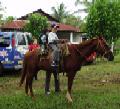Photograph Albums Archive
La Família de Toni — Antonieta Piñera-Páez
Click on picture to view the album.
- Boda de Alejandro y Tony
Distrito Federal, Mexico
12 April | 12 Abril, 2003
-

- Día de la Candelaria en la Casa
de Maricela y Manuel
01 February | 01 Febrero, 2003
The festival of the Virgen de la Candelaria is celebrated on February 2 in various Hispanic Catholic countries. This Día de la Candelaria is a Christian celebration with pagan roots that honors the anniversary of the day Mary and Joseph took Jesus to the Temple in Jerusalem forty days after his birth, in order to perform the required sacrifice of purification. In Mexico, it is linked to the January 6 Día de los Reyes Magos celebration with its cutting of the Rosca bread. Whoever found the baby Jesus, the muñeco, tucked away in a piece of Rosca bread had to pay for a celebration on Día de la Candelaria with tamales and hot chocolate.
-

- Día de los Reyes Magos en la
Casa de Toni
05 January | 05 Enero, 2003
Three Kings Day (Día de los Reyes Magos), also known as the Epiphany, is a Christian celebration that commemorates the Biblical story of the three kings who followed the star of Bethlehem to bring gifts to the Christ child. A popular tradition practiced on this day is serving the Rosca de Reyes – a crown-shaped sweet bread decorated with candied fruits to resemble jewels. Before baking, one or more tiny figures of babies – to symbolize the Baby Jesus – are hidden in the dough.
-

- Año Nuevo en la Casa de Myrna
y Adán
01 January | 01 Enero, 2003
-

- Rancho de los Padres de Nuby en
Chiapas
29 December | 29 Deciembre, 2002
-

- Navidad en la Casa de Toni
25 December | 25 Deciembre, 2002
-

- Nochebuena en la Casa de Maricela
y Manuel
24 December | 24 Deciembre, 2002
-

- Río Grijalva en la Lancha de
Victor
22 December | 22 Deciembre, 2002
The 400-mile (640-km) Río Grijalva, named for the Spanish explorer Juan de Grijalva who discovered it in 1518, is also called the Río Grande de Chiapas in the highland region. It begins in southwest Guatemala and flows north into Chiapas and Tabasco in southern Mexico to the Gulf of Campeche. It is navigable for about 60 miles (100 km) upstream, and several branches of the Usumacinta River flow into it.
Mexico Photo Albums
La Família de Toni
- Boda de Tony y Alejandro
- Día de Candelaria
- Día de los Reyes
- Año Nuevo
- Rancho
- Navidad
- NocheBuena
- Río Grijalva
